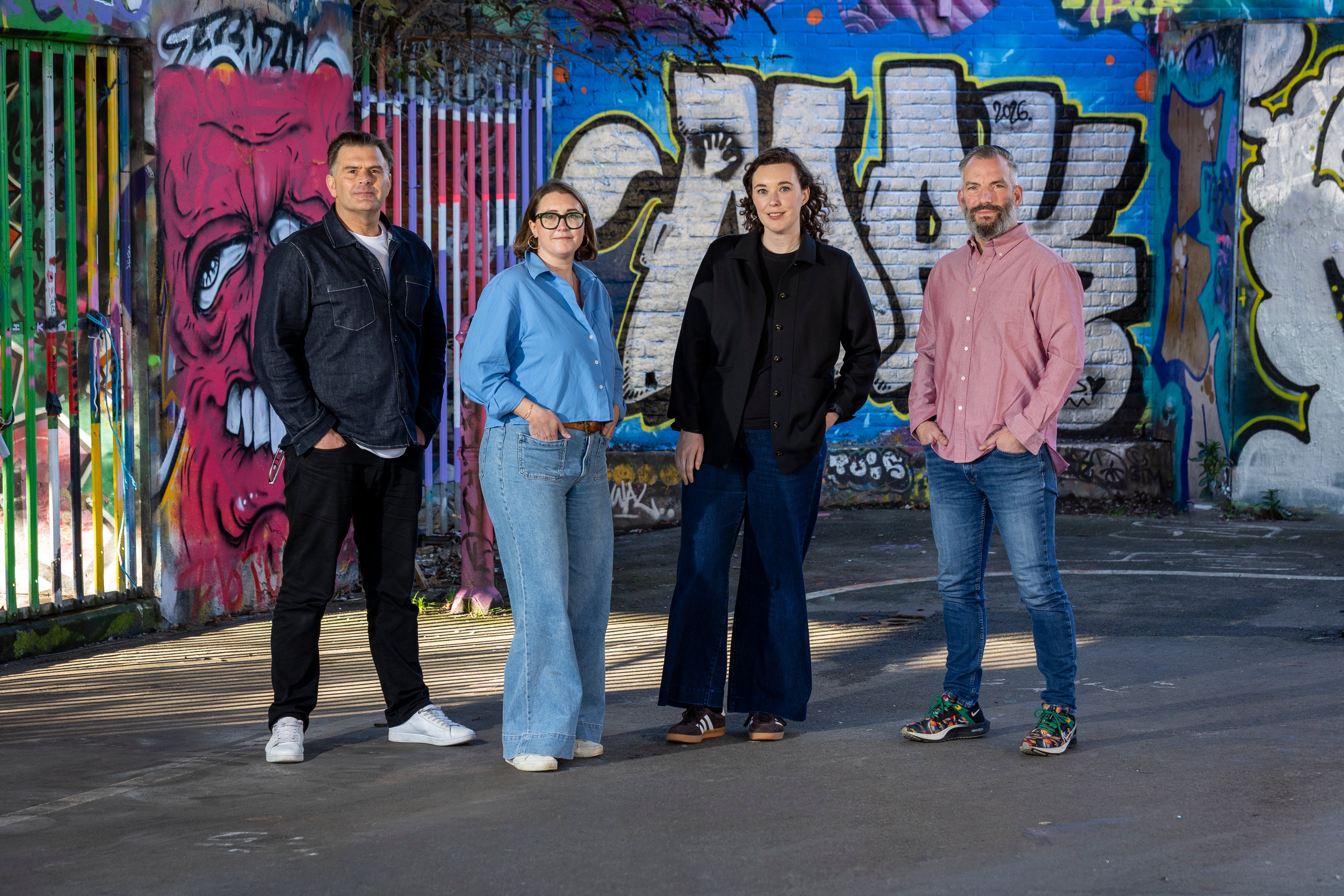In the digital hustle and bustle, social media ads stand out as a golden opportunity for brands to stand out and connect with their audiences.
Ads allow you to cut through the noise, reach your ideal viewers, and engage with them in a space where they spend a significant portion of their day. With the right strategy, you can transform social media ads from mere noise into captivating stories that not only draw the eye but also win the heart. So what makes social media advertising tick? Let’s uncover the secret sauce behind creating social media ads that truly work.
What is social media advertising?
Social media advertising is a way brands promote themselves, their products or services on social platforms like Facebook, Instagram, and TikTok. It's like the digital version of placing an ad in a newspaper, but it appears in the online spaces where people spend their time interacting, and viewing and sharing content.
When you're scrolling through your social media feed, you might come across posts that are clearly labelled as sponsored or ads. These are tailored to grab your attention based on what you like and do online. For instance, if you often look up travel destinations, you might see ads from travel agencies or airline companies.
These advertisements can vary in form—some are images, some are videos, and others might just be text. However, social media advertising allows brands to target ads specifically to people who are most likely to be interested in what's being offered. This targeting is based on information like demographics, interests, the pages a user follows, what they post about, and what type of content they regularly engage with.
The goal of social media advertising isn't just to sell products. It's also about building brand awareness and connecting with your audience in a place where they already spend a lot of their time. This approach helps brands reach the right audience and grow connections in a more personal and direct way.
Types of Social Media Advertising
Brands have multiple strategies at their fingertips to reach their target audience. These strategies can be broadly classified into three key types: paid ads, content-driven audience growth, and influencer marketing. Each type offers unique advantages and can be used in various combinations to maximise reach and engagement.
Paid Ads
Paid ads are the traditional form of social media advertising where brands pay to have their ads displayed to a specific audience. These ads can appear as sponsored posts, in-feeds, banners on the side of the page, or even as interactive stories. The primary advantage of paid ads is their ability to target users based on detailed criteria, including interests, demographics, and behaviour, ensuring that your message reaches the right people.
Content-Driven Audience Growth
Content-driven audience growth focuses on creating and sharing high-quality, engaging content to naturally attract and retain a following. This approach relies on the power of compelling storytelling, useful information, or entertaining content to foster organic engagement. This strategy builds a community around your brand, leading to sustained interest and loyalty.
Influencer Marketing
Influencer marketing taps into the credibility and audience of social media influencers to promote products or services. By collaborating with influencers whose followers align with the target demographic, brands can create authentic and trusted endorsements. This method effectively bridges the gap between brands and consumers, leveraging the personal connection influencers have with their audience to foster a more organic engagement with the brand.
Each of these types offers different benefits and can be tailored to meet specific marketing objectives. While paid ads provide immediate visibility, content-driven growth builds a lasting relationship with the audience, and influencer marketing harnesses trust and credibility. Combining these approaches based on your brand's needs and goals can lead to a comprehensive and successful social media advertising strategy.

What types of social media ads can you run across different platforms?
- Image Ads: Simple yet effective, these ads use striking visuals to grab attention in the News Feed.
- Video Ads: Ranging from short clips to longer narratives, video ads can capture interest quickly.
- Carousel Ads: Display multiple images or videos in a single ad, ideal for showcasing a range of products or telling a brand story.
- Slideshow Ads: A lighter video option that uses less bandwidth, making it great for reaching users with slower internet connections.
- Instant Experience Ads: Full-screen ad experiences that open after a user clicks on an ad, offering an immersive way to interact with content.
- Lead Ads: Designed specifically for mobile, making it easy for users to sign up for more information or download your content.
- Stories Ads: Full-screen ads that seamlessly integrate between user Stories, offering immersive visuals and interactive elements like swipe-up links for direct engagement.
- Reel Ads: Video ads that appear within users' Reels feed, taking advantage of the platform's short-form video content to deliver engaging and dynamic advertisements. Similar to Stories ads, Reel ads provide a full-screen viewing experience and can feature interactive elements to encourage user engagement and action.
- Photo and Video Ads: Appear in users’ feeds and Stories, seamlessly integrating with organic content.
- Stories Ads: Full-screen ads that appear between user Stories, featuring interactive elements like swipe-up links.
- IGTV Ads: Ads that appear when users watch IGTV videos, providing a longer format for more detailed storytelling.
- Reel Ads: Similar to Stories ads, but appear in between Instagram Reels, tapping into the platform’s short-form video content.
- Shopping Ads: Allow brands to showcase their products directly through posts or Stories, making it easy for users to shop.
YouTube
- Skippable and Non-Skippable Video Ads: Appear before, during, or after videos, with skippable ads allowing users to skip after 5 seconds.
- Bumper Ads: Short, non-skippable video ads up to 6 seconds long, ideal for reaching viewers with a concise message.
- Action Ads: 15-30s conversion-focused ads.
- Overlay Ads: Text or image ads that appear on the lower portion of the video, offering a non-intrusive advertising option.
- Display Ads: Appear next to the video player on the watch page, visible on desktop.
- Sponsored Cards: Display content relevant to the video, such as products featured in the video.
TikTok
- In-Feed Ads: Appear as users scroll through their "For You" page, blending in with organic content but labelled as sponsored.
- Brand Takeover Ads: Full-screen ads that appear when users first open the TikTok app, offering high visibility.
- TopView Ads: Similar to brand takeovers but appear after 3 seconds of app launch, allowing for longer video content.
- Hashtag Challenges: Sponsored challenges that encourage user-generated content around a specific hashtag, promoting engagement and brand awareness.
- Branded AR Content: Custom filters, stickers, and AR effects that users can apply to their own videos, promoting interactive engagement.
- TikTok Shopping Ads: These allow brands to showcase and sell products directly within the TikTok app, creating a seamless shopping experience for users
- TikTok Spark Ads: These promote organic TikTok videos that are already performing well, helping brands amplify and boost successful content.
Each platform offers unique ad formats designed to engage their specific user base effectively. By understanding and leveraging the strengths of each type of ad across different platforms, brands can create more targeted, engaging, and successful social media advertising campaigns.
%20(1)-4.jpg?width=1000&height=560&name=news%20and%20views%20images%20(3)%20(1)-4.jpg)
How Does Social Media Advertising Work?
Social media advertising leverages the vast networks of users on platforms like Facebook, Instagram, YouTube, and TikTok to deliver targeted advertising content to a specific audience. It’s a powerful tool for brands looking to increase brand awareness, engagement, and conversions. Here's a breakdown of how it works:
Targeting the Right Audience
The first step in social media advertising is defining and understanding the audience you want to reach. Platforms offer sophisticated targeting options based on demographics (age, gender, location), interests (hobbies, favourite entertainment), behaviour (purchase history, device usage), and more. By utilising these targeting features, advertisers can ensure their messages reach the people most likely to be interested in their products or services.
Choosing the Ad Format
Once the audience is defined, the next step is selecting the most appropriate ad format. Each social media platform offers a variety of ad types, from simple image ads and immersive video ads to interactive polls and AR experiences. The choice depends on the campaign goals, the nature of the message, and the preferences of the target audience.
Crafting Compelling Content
The success of an ad campaign hinges on the quality of the content. Advertisements should be engaging, relevant, and valuable to the target audience. This could mean creating eye-catching visuals, compelling video stories, or informative and entertaining text. The content should also include a clear call to action (CTA), guiding users on what to do next, whether it's visiting a website, making a purchase, or following a social media account.
Setting a Budget and Bidding
Social media advertising operates on a bidding system, where advertisers set a budget and bid for ad placement.
You can opt for cost-per-click (CPC), where you pay each time someone clicks on your ad, or cost-per-impression (CPM), where you pay based on how many people see your ad. Other options include cost-per-view (avg. CPV) - the average amount that you pay each time that someone views your video ad. It equals the total cost of all views divided by the total number of views. This differs from maximum CPV, which is the most that you're willing to pay for an ad view. You can also base your spend on cost-per-acquisition (CPA) meaning you pay when a user converts (takes the action you want) on your ads.
Platforms provide tools to manage your budget effectively, allowing you to specify daily or campaign-wide spending limits.
Monitoring and Optimisation
After launching an ad, it's crucial to monitor its performance and make adjustments as needed. Social media platforms offer analytics tools that provide insights into how ads are performing in terms of reach, engagement, clicks, and conversions. Advertisers can use this data to tweak their campaigns, adjusting targeting, ad format, content, and budget allocation to improve results.
Compliance and Best Practices
Finally, it's important to adhere to each platform's advertising guidelines and best practices. This includes respecting privacy laws, ensuring content is appropriate and non-misleading, and maintaining a positive user experience. Failure to comply can result in ads being rejected or accounts being penalised.
-1-Apr-19-2024-02-05-21-0376-PM-1.png?width=1000&height=560&name=News%20%26%20Views%20Image%20Blocks%20(44)-1-Apr-19-2024-02-05-21-0376-PM-1.png)
Why Content is King—Even When It Comes to Paid Social Media Ads
Not just any content will suffice in a world where users are exposed to so many ads. The demand for broadcast-quality content with high production value and creative storytelling is on the rise.
Elevating Brand Perception
First impressions matter. Make sure the first three seconds of your ad are eye-catching and hook your audience to stop them scrolling past. When users encounter social media ads, the quality of the content immediately influences their perception of the brand. High-quality content with a professional finish positions a brand as credible, trustworthy, and premium. You’re not just trying to capture attention, you also need to find ways to build connections with the audience through engaging storytelling.
Enhancing Viewer Engagement
Engagement is the currency of social media, and content that tells a compelling story or delivers a visually stunning experience is more likely to be liked, shared, and remembered. Broadcast quality content often includes elements like high-definition visuals, crisp audio, and engaging narratives that draw viewers in. Little Dot Studios specialises in crafting such content, ensuring that social media ads don't just reach their audience but resonate with them on a deeper level.
Boosting Conversion Rates
The ultimate goal of social media advertising is to drive actions—whether that's making a purchase, signing up for a newsletter, or following a brand's page. Ads that feature broadcast quality content are more effective in persuading users to take these actions. By investing in top-tier production values, Little Dot Studios creates ads that stand out in a crowded feed, compelling viewers to engage with the brand beyond the initial view.
Creating Shareable Content
In the age of social media, shareability is a key factor in amplifying a campaign's reach. Broadcast quality content is more likely to be shared, extending the ad's visibility beyond the original target audience. Little Dot Studios understands the power of shareable content, designing ads that viewers want to show to their friends and followers, thereby increasing the campaign's organic reach.
Meeting Platform Expectations
As social media platforms evolve, so do their algorithms and user expectations. Platforms favour high-quality content that engages users, and their algorithms are formulated to give this content greater visibility. Little Dot Studios’ expertise in producing broadcast-quality content ensures that their social media ads are not only favoured by algorithms but also meet and exceed the expectations of sophisticated social media users.
Tips for Creating Social Media Ads That Work
Creating effective social media ads requires a blend of creativity, strategic planning, and an understanding of your audience's preferences. Here are some practical tips:
Don’t Just Know Your Audience - Understand Them
Before crafting your ad, have a clear understanding of who your audience is. Dispel any assumptions and use social media analytics and market research to gather insights about your audience's demographics, interests, and behaviours. Tailoring your content to the preferences and needs of your target audience increases the likelihood of engagement and conversion.
Keep It Simple and Clear
Simplicity is key in social media advertising. Your message should be straightforward and easy to understand at a glance. Use clear, concise language and ensure your visuals are not cluttered. A clear call-to-action (CTA) should guide users on what steps to take next, whether it's visiting a website, making a purchase, or following your social media page.
Test and Optimise
Don't use a one-size-fits-all approach. Run A/B tests on ad elements like headlines, creatives, and CTAs to find what works best. Use the data to continually refine and optimise your campaigns.Creative testing is crucial for identifying winners and making informed decisions. Try advanced techniques like multivariate testing (testing multiple factors at once), copy testing, and user testing (small-scale testing such as polls or focus groups).
Approach creative development iteratively and data-driven. Continuously gather feedback, analyse results, and make incremental improvements. This will maximise ad performance and deliver effective creative.Effective advertising isn't about a perfect ad, but learning, testing, and optimising to find the right combination for your business. Stay agile and responsive to unlock full potential.
Stay True to Your Brand Voice
Consistency is crucial in building brand recognition and loyalty. Ensure that your social media ads reflect your brand's voice, style, and values. This consistency helps in creating a cohesive brand experience across all platforms, making your brand more memorable to your audience.
Use Platform-Specific Features
Tailor your content and ad format to leverage the unique features of each social media platform. For instance, use Instagram's carousel feature to showcase multiple aspects of a product or exploit TikTok's viral trends and music to make your ad more relatable and shareable. It’s important to note that the music used in ads must be properly licensed, meaning you need to obtain the necessary permissions and rights from the copyright holders. For TikTok ads, you can always leverage the TikTok commercial music library - all of which are royalty-free and pre-approved for use in TikTok ads. Understanding the native content formats and user behaviour on each platform can significantly increase your ad's performance.
Integrate Interactive Elements
Increase engagement by including interactive elements in your ads. Polls, quizzes, and augmented reality (AR) filters encourage users to interact with your ad, making the experience memorable and fun. These interactive ads can also provide valuable feedback and insights about your audience's preferences and behaviours.
Optimise for Mobile Viewing
With the majority of social media browsing happening on mobile devices, ensure your ads are optimised for mobile viewing. This means using vertical or square formats for videos and images, ensuring text is readable on smaller screens, and making sure your landing pages are mobile-friendly. A seamless mobile experience is crucial for keeping the audience engaged and driving conversions.
Leverage Timing and Seasonality
Timing your ads can significantly impact their effectiveness. Consider the time of day, days of the week, and even seasonality when planning your campaigns. For instance, aligning your ads with holidays, events, or trends relevant to your audience can make your content more timely and engaging.
Use Retargeting to Re-engage
Implement retargeting strategies to reach individuals who have previously interacted with your brand but haven't converted. Social media platforms offer retargeting options that allow you to show ads to users who have visited your website, used your app, or engaged with your content. Retargeting keeps your brand top of mind and can nudge users further down the conversion funnel.
Emphasise Social Proof
Incorporate elements of social proof in your ads, such as testimonials, influencer endorsements, or user reviews. Seeing that others have had positive experiences with your brand can build trust and credibility, making new users more comfortable taking the desired action. This is a crucial part of the purchase decision for Gen Z in particular.
Create Exclusivity and Urgency
Craft your messages to create a sense of exclusivity or urgency. Limited-time offers exclusive discounts for social media followers, or early access to new products can compel users to act quickly. Such tactics should be used sparingly to maintain their effectiveness and ensure they align with your brand's overall messaging.
Prioritise Authenticity
In a digital space crowded with ads, authenticity can set your brand apart. Strive for genuine connection rather than overt selling. Share stories, behind-the-scenes content, or user experiences that highlight the human side of your brand. Authentic content resonates deeply with audiences and fosters a stronger brand relationship.
Elevate Your Brand’s Social Media Presence with High-Impact Content
By focusing on high-quality content, leveraging platform-specific features, and maintaining authenticity, brands can connect with their audience in meaningful ways, driving not just visibility but genuine engagement and conversions.
At Little Dot Studios, our expertise in creating broadcast-quality content and leveraging cutting-edge social media strategies ensures your brand captures attention and achieves remarkable results. Learn how we can help you craft impactful social media & paid media advertising campaigns that not only reach your target audience but also inspire action. Get in touch!




